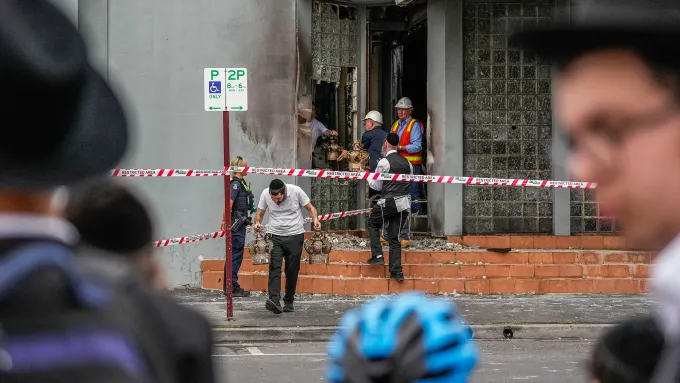Australia is facing an alarming rise in antisemitic attacks, particularly in its two largest cities, Sydney and Melbourne. The Jewish community, which comprises around 117,000 individuals, is increasingly anxious as a series of violent incidents, including arson attacks on synagogues, the defacement of buildings with swastikas, and other hate crimes, have left many in fear for their safety.
One of the most devastating attacks occurred in late October when arsonists set fire to the Continental Kitchen, a kosher restaurant in Sydney that had been serving the community for over 50 years. Judith Lewis, the owner, was devastated when the mezuzah, a cherished symbol of Jewish faith, was destroyed in the blaze. Despite her efforts to keep her business running, she has been hesitant to hang a new mezuzah in her new location, unsure of the future in the face of such hostility.
While more than a dozen individuals have been arrested, Jewish leaders are urging government officials to take stronger action against this rising tide of hate. The authorities, in turn, have formed a special task force, Special Operation Avalite, to address the surge in antisemitic incidents. So far, over 166 reports of antisemitic attacks have been received since mid-December.
Australian police are now focusing on a wider investigation, extending beyond local suspects. Authorities are exploring whether international actors might be financing the attacks. This potential connection to foreign sources is being actively investigated, with officials mentioning the possibility that “overseas actors” might be involved in orchestrating the violence. Prime Minister Anthony Albanese has indicated that Australia’s international intelligence partners, including the United States, United Kingdom, Canada, and New Zealand, are playing a role in the investigation.
Text messages seized from two men involved in an arson attack suggest that these attacks may not have been solely driven by local animosity. Court documents reveal that a third individual, known only by the handle “jamesbond,” may have directed the arsonists, raising questions about the orchestration of these incidents by external players. In one message, the arsonists expressed frustration over a failed attack, suggesting they were misled about the targets. This points to a potential coordinated effort beyond mere local crime.
As the investigation unfolds, security has been heightened at Jewish sites across Sydney, including synagogues, schools, and other community spaces. The government has come under scrutiny for its perceived slow response to these attacks, which some claim were predictable in light of the heightened tensions around the Gaza conflict. Opposition leaders argue that the government’s delayed reaction to protests and rising hate crimes is a contributing factor to the current surge in antisemitic violence.

In a joint statement, several human rights and faith organizations condemned the hate crimes, emphasizing the need for unity and calling for political leaders to avoid exploiting such tragedies for political gain. There are also concerns that similar attacks against Palestinian and Muslim communities have gone underreported for fear of retaliation or inaction from authorities.
Police remain determined to investigate every angle of these attacks, with some speculating that foreign influence, possibly even linked to Russian intelligence, could be at play. Whether or not cryptocurrency has been used for illicit payments remains unclear, and investigators are working hard to track down the source of funding.
While authorities are continuing their efforts, Jewish groups argue that combating antisemitism requires more than just arrests. Community leader Max Kaiser of the Jewish Council Australia stressed that systemic racism is at the heart of the issue, which requires broader societal changes, including education and interfaith dialogue, to address the root causes of such hatred.
Judith Lewis, still reeling from the destruction of her business, expressed her disbelief at the leniency of the sentences given to the perpetrators. She continues to hope for justice, but has found solace in the overwhelming support from her community, who rallied around her business, helping it to reopen despite the immense setback.


